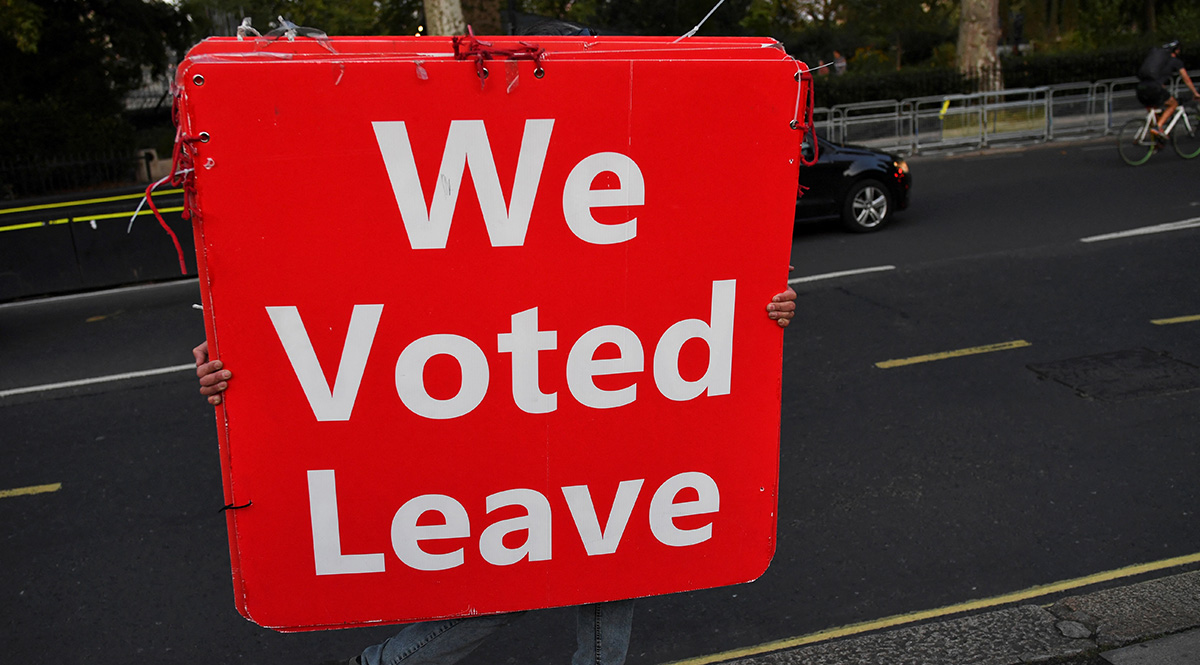UK Economy Struggles 8 Years After the Brexit Referendum
The UK started witnessing economic costs of the decision to leave the EU right after the 2016 referendum. It is today undergoing a prolonged economic crisis that has serious social and political consequences. Brexit is not the only factor behind these problems, and economies similar to the UK are also suffering from difficulties associated with a series of global crises. However, the deterioration in the UK’s economic performance already between the referendum and the COVID-19 pandemic in Europe points to the very negative effects that the decision to leave the EU has had for the UK.
 Dylan Martinez / Reuters / Forum
Dylan Martinez / Reuters / Forum
Cost of Living Crisis
Since the end of 2021, the UK has been experiencing inflation higher than wage growth and, as a result, a fall in real disposable income (i.e., income after taxes). This is caused by both domestic and international issues. Since 2010 (except during the pandemic), the UK has been pursuing a policy of fiscal austerity that has led to deficit reduction, but also criticism for cutting funding for public services (e.g., healthcare, infrastructure, culture, education). In June 2016, British voters decided to leave the EU, which was expected to involve profound changes in economic governance. Even before the final conclusion of the EU exit process (Brexit formally took place on 1 February 2020 and the UK's exit from the EU single market at the end of that year), a series of global crises related to the COVID-19 pandemic and Russia’s aggression against Ukraine had begun.
The cost of living crisis is translating into hardships for UK residents. Research by the Office for National Statistics from spring 2022 showed that the rising costs of living worried 77% of those questioned. In a 2024 survey by the Prince’s Trust, a charity dedicated to helping young people, 49% of respondents said the current crisis was having a worse impact on their lives than the COVID-19 pandemic, and 34% said it was having a very negative impact on their mental health. Rising costs also translated into an increase in shoplifting, which was up 37% year-on-year in 2023. The UK is also facing a wave of strikes, including postal, railway, stagecoach and bin workers, but also barristers and doctors.
In response, the government lowered the age limit for workers to receive the full minimum wage from 25 to 21 and raised it by more than 30% since March 2021. Increases in the minimum wage for workers under 20, minors, and trainees were even higher in percentage terms. In view of rising energy prices and the problem of fuel poverty, the authorities have introduced energy subsidies. They are also running a programme of direct subsidies and valorisation of social benefits, which is expected to amount to up to £104 billion between 2022 and 2025. These measures have been funded by, among other things, the introduction of a windfall tax on oil and gas companies, which is expected to remain in force until the end of March 2029 or a sustained fall in energy prices.
The Impact of Brexit on the UK Economy
Experts’ and market participants’ attitudes towards the UK’s exit from the EU were negative even before the referendum, with future effects already included in market actors’ decisions after the result was announced. In the period between the Conservative Party’s victory in May 2015 and subsequent confirmation of plans to hold a referendum and the end of 2016, the pound depreciated by around 20% against the dollar. While the UK economy grew faster than most G7 economies between 2012 and 2015, it ranked fourth each year between 2017 and 2019, with the average level of growth falling by around 0.3 percentage points between these two periods. Quantitative research has confirmed negative referendum effects even before the actual withdrawal from the EU, and it has identified the anticipated adverse economic effects as the primary cause, but also the uncertainty resulting from the lack of technical details of Brexit, which were unknown and contested. The performance of the UK economy in the period between the referendum and the outbreak of the COVID-19 pandemic thus confirmed economists’ consensus predictions from before June 2016 about the high costs and, consequently, the economic unviability of leaving the EU.
Research conducted after the UK’s exit from the EU and the single market must reckon with the problem of distinguishing the effects of Brexit from the effects of a series of crises in the global economy related to the COVID-19 pandemic and Russia’s aggression against Ukraine. In autumn 2023, the UK’s National Institute of Economic and Social Research (the oldest independent economic research institute in the UK) estimated the cost of Brexit at 2-3% of UK GDP as of then and forecast it to rise to 5-6% in 2035. According to investment bank Goldman Sachs, the effect could have been between 4% and 8% of GDP in the period since the referendum. Researchers attribute these negative results, among other things, to increased trade costs with the EU and a decline in investment. There is no consensus on the effect of changes in migration policy, as the overall balance of migration to the UK has increased due to increased flows from outside the EU. Research from the London School of Economics indicates that Brexit is responsible for around a third of the rise in food prices in recent years, which is particularly important in the context of the cost-of-living crisis.
Regardless of the methodology, the losses associated with the UK’s withdrawal from the EU outweigh the gains from the cessation of contributions to the EU budget, where the UK’s net contribution amounted to around 0.5% of GDP in 2018 (according to ONS statistics). The large-scale deregulation promised by Brexit supporters has yet to be seen. EU law has been applied in the UK after leaving to maintain regulatory continuity. Legislative arrangements to change its status and accelerate legislative reform came into force at the beginning of 2024, but the changes are taking longer than expected. Since leaving the EU, the UK has been concluding trade agreements, using the opportunity to negotiate on its own, with Japan (even before leaving the Common Market, in October 2020), Australia, and New Zealand, and one with Norway, Iceland, and Liechtenstein, among others; and the CPTPP agreement with Pacific countries, which has not yet entered into force for the UK (likely to happen by the end of this year). Although new agreements are being negotiated, there is no progress on the most important one, the deal with the US. Moreover, some of the agreements are similar to those concluded by the EU, including the ones with Japan and with Norway, Iceland and Liechtenstein. It is therefore impossible to conclude that, eight years after the referendum, the assumed positive economic effects of Brexit are coming true, although regulatory changes and the negotiation of new trade agreements were certainly slowed down by the COVID-19 pandemic and the consequences of Russia’s aggression against Ukraine.
Conclusions
The UK is going through one of the most economically difficult periods in its recent history due to the overlapping effects of Brexit and a series of global economic and political crises. The current problems have been fundamentally influenced by the COVID-19 pandemic and Russia’s invasion of Ukraine and its effects on energy prices, but leaving the EU has significantly contributed to and exacerbated them and is making it more difficult to counteract the effects of the crises.
The example of Brexit illustrates that leaving the EU is, on the economic level, an extremely difficult and risky undertaking. The mere announcement of a planned withdrawal can lead to serious losses. The situation in the UK shows that even a country with a high level of political and administrative culture is not able to limit all the negative effects or take advantage of emerging opportunities so as to ultimately benefit from leaving the EU, at least in the short to medium terms, although forecasts for further developments are also negative. This indicates that EU membership is economically beneficial also for net contributors to the EU budget, and that the cessation of the application of EU law and legislative reform is a heavy burden for legislators.
The negative effects of Brexit show that there are no realistic alternatives to Poland’s EU membership as a basis for the country’s foreign economic policy, and that the impact of financial transfers is smaller than membership in the common market. It would be desirable to strengthen the political consensus around this issue and to raise public awareness as to the benefits of membership, especially in the context of a possible deterioration of the balance of transfers and, in the longer term, Poland’s transition to the status of a net contributor to the EU budget.





